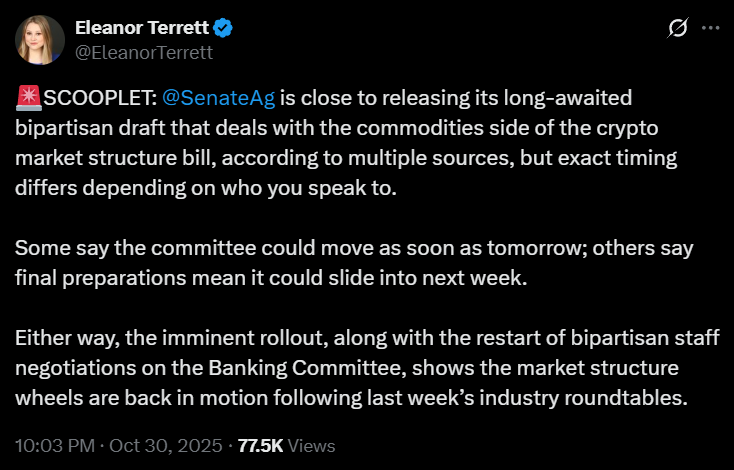Key Highlights
- The U.S. Senate is reportedly finalizing a bipartisan draft bill to clearly regulate major cryptocurrencies like Bitcoin and Ethereum as “digital commodities.”
- These new legislative efforts are part of a larger government push, including recent laws on stablecoins and banking
- The new rule would place the U.S. as a global leader in digital assets
The United States Senate is expected to take its most significant step yet in regulating the cryptocurrency market. After months of negotiations, the Senate Agriculture Committee is finalizing a bipartisan draft bill that would establish clear rules for digital commodities or cryptocurrencies like Bitcoin and Ethereum.

(Source: Eleanor Terrett on X)
According to multiple sources familiar with the process, the draft could be made public as early as today, though last-minute details might push the release to next week. After a decade of regulatory ambiguity, this latest legislative effort for the crypto sector is a major shift from regulatory uncertainty toward a structured legal framework.
This legislative push comes after a series of intense meetings last week between lawmakers and top executives from the cryptocurrency industry. During these roundtables, industry leaders stressed the urgent need for clarity, particularly on how decentralized finance, or DeFi, should be supervised and which federal agency holds authority over different digital assets. This draft bill is a direct response to these concerns.
The Details of the Coming Draft
The upcoming draft legislation, developed under the leadership of Committee Chairman John Boozman, a Republican from Arkansas with input from Democratic Senator Cory Booker of New Jersey, aims to provide that clarity.
Reports indicate that the bill will formally define what constitutes a “digital commodity.” This definition is expected to include major assets like Bitcoin and Ethereum, placing them under the oversight of the Commodity Futures Trading Commission.
This bill would significantly expand the CFTC’s powers, granting it authority to regulate spot markets, which are markets for immediate transactions. To protect consumers and ensure market integrity, the legislation is also expected to include strong measures to prevent market manipulation, introduce consumer protections for DeFi users, and lay out a framework for regulating stablecoins. It is a digital currency pegged to stable assets like the U.S. dollar.
Aggressive Push for Comprehensive Reform
In 2025, the cryptocurrency community witnessed major regulatory developments, thanks to pro-crypto President Donald Trump. It is part of a larger, coordinated push within the Senate. In the Senate Banking Committee, bipartisan staff have resumed work on a separate but related bill known as the Responsible Financial Innovation Act.
The goal among key lawmakers is to combine these 2 bills into a single, powerful legislative package. There is a strong desire to have this unified market structure bill ready for a vote and sent to the President’s desk before the end of the year.
The momentum behind these bills is generating considerable optimism within the financial and technology sectors. Coinbase CEO Armstrong recently stated that he believes there is a “good chance” for the legislation to pass.
He and others predict that once clear rules are established, trillions of dollars in institutional investment will flow into the digital asset space.
Building on a Foundation of Pro-Innovation Policies
The current legislative momentum is not an isolated event. It builds upon a series of pro-innovation policies enacted by the U.S. government since the start of the year. In January, an Executive Order from the Trump administration explicitly banned the development of a central bank digital currency, easing privacy concerns, while simultaneously endorsing the use of open blockchain technology and USD-backed stablecoins.
Then, in July, Congress passed the first federal stablecoin law, the GENIUS Act. This law requires all stablecoins to be fully backed by real reserves and to comply with all existing banking laws.
This provided the clarity that major financial institutions were waiting for. JPMorgan, Bank of America, and Citigroup have all since announced plans to launch their own stablecoins and expand their blockchain-based services.


